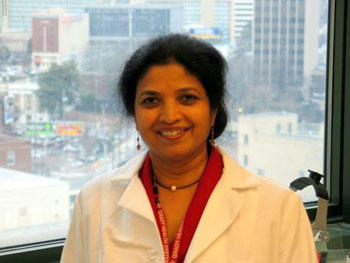Grantee Spotlight: Veena Rao, Ph.D. - Unraveling the Mysteries of BRCA1 in African American Women
, by CRCHD staff
Unraveling the mysteries of the BRCA1 gene and its role in breast and ovarian cancer in diverse populations has guided the research of Dr. Veena N. Rao, a CRCHD PACHE U54 grantee. Her other passion is training diverse scholars in cancer health disparities research.
Rao is a Professor and Co-Director of the Cancer Biology Program and Georgia Cancer Coalition Distinguished Cancer Scholar in the Department of OB/GYN at the Morehouse School of Medicine in Atlanta, Georgia.
For the past 20 years, Rao has been investigating the inner workings of the BRCA1 gene which has been linked to breast and ovarian cancer, including triple negative breast cancers that are more prevalent in African American women. Triple negative breast cancers are highly aggressive and have higher rates of metastasis. There are currently no targeted treatments for this type of breast cancer.
Rao explains that the “the primary function of the BRCA genes is to repair cell damage and keep breast cells growing normally. But when these genes contain abnormalities or mutations that are passed from generation to generation, the gene products do not function normally – and the risk for breast cancer increases substantially.” She continued, “But when an African American woman has triple negative breast cancer as a result of a mutation of BRCA1, this mutant protein stays in the cytoplasm and can develop into a tumor.”
Simply put, Rao said, “If the cancer can be detected early, we can break the disparity between African Americans and whites.”
Rao’s team was the first to find evidence that BRCA1a induces cell death in breast cancer cells. They were also the first to introduce BRCA1a into triple negative breast cancer by gene therapy, successfully blocking tumor development in mice. In addition to breast and ovarian cancer, Rao believes abnormalities in the BRCA1 gene may also play a role in other diseases such as obesity and diabetes. Rao has been awarded five U.S. patents for her research which includes a recent patent for BRCA1 function based assays to develop targeted therapy for TNBC.
Rao’s love of science began in the ninth grade when her teacher persuaded her to write a science paper, but she attributes much of her interest in research to her father who was an electrical engineer, as well as her mother who consistently read her books at a very early age on Marie Curie and presently she derives her inspiration from the life of Helen Keller.
Part of Rao’s U54 grant is her promise to bridge the scientific gap by bringing minority students into scientific careers. Since coming to Morehouse in 2002, numerous students have worked in her laboratory from high school students, undergraduate, graduate, medical students, postdoctoral fellows, junior faculty, and clinicians.
Rao advises her students that there are three things you need to be a good scientist. “It’s about passion, it’s about honesty and most importantly science consists of hard work,” she said.
